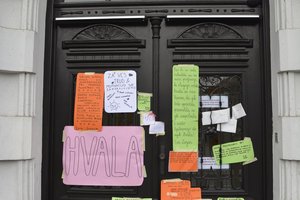Slovenia: on-line schooling due to epidemic

In the middle of October, Slovenia has entered a second-wave of COVID-19 epidemic. Slovenian government has closed down schools and universities as part of the measures. The entire country has been in lockdown: public gatherings are prohibited, non-essential stores are closed as well as gyms, salons and other services. The movement of people is restricted to municipality and police curfew is in place from 9pm to 5am. Despite these restrictive measures, the number of infected cases has not decreased and Slovenia remains among the most infected countries in Europe.
Elementary and high schools have organized distance learning with clases taking place online. The National Education Institute of the Republic of Slovenia has prepared guidelines for primary and secondary schools on how to conduct distance learning. They have developed various material, which are available to teachers for planning and implementation of educational work. While on-line classes have been working well for some, it has also caused various challenges: several families with more than one child do not have sufficient number of computers at home to organize on-line schooling. Moreover, younger children cannot stay at home alone and need a lot of support in schooling, making it impossible for the parents to continue working. In addition, professionals warn against the long-term effects of on-line school and lack of socialization among the peers.
Despite several calls from teachers and parents to open schools as soon as possible, there is no indication on when this will happen. As the end of the year approaches, the government is easing some measures in support of the economy, yet considering the high level of infections, it remains unclear what this will mean for the potential re-opening of schools in January 2021.
Photo: Students in one of the high schools in Slovenia (high school Kranj) show appreciation to the efforts of the teachers by posting thank you notes on the school door. One of the messages says: “Thank you for your patience, perseverance and tolerance in the face of challenges, misunderstandings and the need for new explanations.” (Source: Gimnazija Kranj).